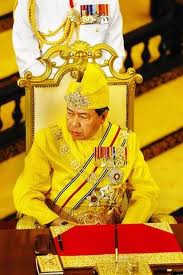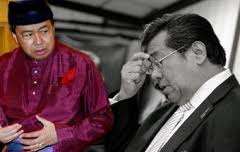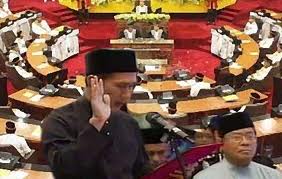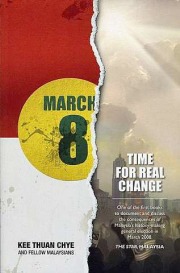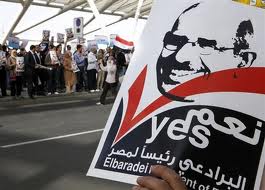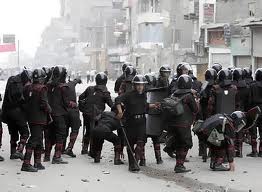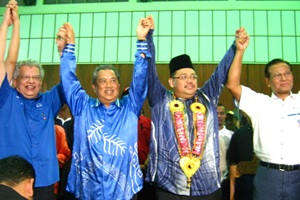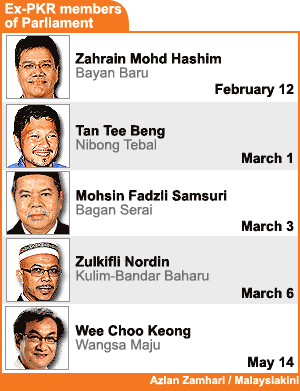January 31, 2011
Bridget Welch* on Tenang By-Elections
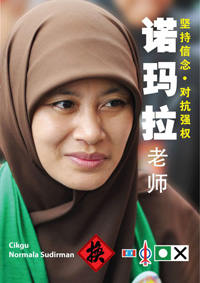 Malaysia’s 14th by-election since March 2008 scored another victory in the BN column, as they held onto their seat. This was expected, as it was home ground for UMNO and the contest was purely about the winning majority.
Malaysia’s 14th by-election since March 2008 scored another victory in the BN column, as they held onto their seat. This was expected, as it was home ground for UMNO and the contest was purely about the winning majority.
Even with the lower voter turnout, UMNO did well with a comfortable and higher majority of 3,707. Rather than provide a numerical assessment of the voting results, let me share some broader observations and tensions that arise from the Tenang campaign.
Despite the centrality of machinery and money, this election highlights the increasing challenges of engaging the diverse electorate in Malaysia. Arguably, the dynamics of the by-election in Johor muddy the waters, making the decisions about national electoral strategies and tactics even more complex.
Decision to proceed irresponsible
The most defining feature of this election was the weather. It was dreadful, and it negatively affected the polling. Watching voters drench themselves to vote, despite umbrellas, and wade in up to knee-high water to the polling station, made me question whether the by-election was worth the risks involved.
I remain deeply puzzled why this by-election was not postponed. I woke up the morning of the  poll thinking that it might already be time for Noah’s Ark as the overnight downpour had already affected roads and submerged parts of the constituency.
poll thinking that it might already be time for Noah’s Ark as the overnight downpour had already affected roads and submerged parts of the constituency.
The fact that four polling stations (30 percent of the stations) were inaccessible by early afternoon made this question even more salient. It is fortunate that no one was seriously hurt and some voters were able to navigate the slick hazardous conditions, as the decision to continue with the polls appeared irresponsible.
Voters, however, braved on. They believed strongly in their civic responsibility to vote, to have their opinion recorded despite the inconveniences involved in casting it. This speaks to an important feature of Malaysian politics, that even despite lackluster campaigns on both sides, when asked to act responsibly, to fulfill their roles as citizens, they do so.
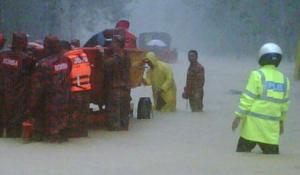 It was not only a matter of reward or partisanship, but a deep-seated desire both to be heard and be part of the national political landscape. Johoreans, in particular, feel left out of the excitement, and don’t like to be ignored.
It was not only a matter of reward or partisanship, but a deep-seated desire both to be heard and be part of the national political landscape. Johoreans, in particular, feel left out of the excitement, and don’t like to be ignored.
What was striking is that the weather highlighted perhaps the biggest governance problem locally – flooding. While it is easy to think that climate change and heavy rain were responsible, the fact remains that flooding is also man-made.
The land development practices of clearing land and failure to adequately monitor deforestation have contributed to the high siltation of the streams and river and created increased vulnerability to flooding. The low-lying areas are well-known, but the problem has clearly been inadequately addressed.
Part of the problem is that flooding lies in the multiple jurisdictions of state and federal authorities, but this should not have been an excuse in Johor. The infrastructure is not up to par, and regular flooding is now the norm. Just a few years ago, areas in Johor were completely submerged.
This by-election is a wake-up call to the BN government to act responsibly. The Tenang by-election showcased the problem of flooding that is now frequent in semi-rural areas throughout the country. It is a national problem that needs attention. Many of the voters who opted for the BN did so with the hope that conditions would improve in the future, that their civic responsibility would yield a more responsible government response.
Chinese not spooked by Islamic State
The reasons people voted as they did are not so easy to capture. Three interesting features 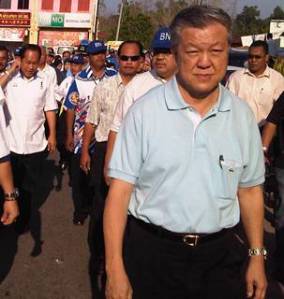 stand out. First, the focus among voters was on the party rather than the candidate. For BN voters, the dominant thread was loyalty to UMNO. For the majority of opposition voters, the focus was primarily on Pakatan Rakyat.
stand out. First, the focus among voters was on the party rather than the candidate. For BN voters, the dominant thread was loyalty to UMNO. For the majority of opposition voters, the focus was primarily on Pakatan Rakyat.
Chinese voters were not as scared off with the Islamic State tactics, while those loyal to PAS continued to feel both a connection to the Islamic Party and its cooperation with other component partners. In other by-elections, the candidate chosen was decisive. Here, given the credentials of both candidates, party emerged as more central.
This suggests that while the choice of candidate may be increasingly important in urban areas, the image and identity of the party remains central in more semi-rural communities. Both of the main parties concerned – UMNO and PAS – have challenges in improving their images and profiles in parts of the country, especially those where they have limited machinery or tainted images.
Another feature of Tenang was the lack of political awareness or interest. Many, especially in the more rural areas, had never even heard of Pakatan and many were just not interested in politics.
The intense politicking followed closely by Malaysiakini readers does not permeate the lives of Tenang voters, and they like it that way. Unlike Sibu, there was not a major political awakening in Tenang and voters did not relate to many of the opposition concerns about corruption and justice.
This is a challenge politically, as many outside of urban centres have limited sources of political information and do not connect with issues touted by the urban-based political leaders the same way. Take ‘Interlok’, for example. This book was seen as distant from the life experience of voters. Meshing political issues with local outlooks remains a challenge across the political spectrum.
 Finally, given the dominance of UMNO and its close relationship to government officials, one of the most difficult issues involves the blurred lines between government and party. The nasty weather conditions brought this to the fore, as police, fire officials, rural development authorities and election officials faced real challenges in managing their jobs neutrally.
Finally, given the dominance of UMNO and its close relationship to government officials, one of the most difficult issues involves the blurred lines between government and party. The nasty weather conditions brought this to the fore, as police, fire officials, rural development authorities and election officials faced real challenges in managing their jobs neutrally.
The scarce resources of boats and equipment added to the perception – deeply held in the Chinese-majority areas where assistance was less forthcoming – that civil servants did not respond fairly. It was exacerbated by the perception and reality that voting cut along ethnic lines and added to the view that the response was ethnically biased.
Further investigation is needed to assess this, but the perception remains and is a product of the government’s failure to draw sharp lines between what is for the party work and what belongs to the citizens at large.
Given the multiple jurisdictions of governance and increased competitiveness, the need for civil servant neutrality is even more pressing. Any election should ultimately not rest on the selective use of government resources for the interest of any party. It makes the victory hollow, and raises ethical concerns and feeds unnecessarily into the increasingly racialised political lens.
Soul searching for PAS and MCA
As the waters subside, there are two political parties that have the most soul-searching to do. First is PAS. They are losing Malay ground in semi-rural areas. While in fairness, they had little support in the first place in Tenang, this election taken with the totality of results in the past few elections, including Galas in Kelantan, suggest some serious rethinking.
The challenge for PAS is how to gain support in semi-rural areas that are multi-ethnic constituencies, e.g. Galas, Tenang and Merlimau, especially those in western and southern parts of Peninsular Malaysia.
The Islamic State agenda polarised the electorate creating a zero-sum dynamic. Finding an identity that is inclusive, across races, and does not put pressure on Pakatan partners is not easy. The recent by-elections point to PAS’ Malay deficit, one that is focused in some areas more than others.
PAS is not able to effectively engage FELDA settlers and break into traditional UMNO ground. Despite the strong candidate, PAS appeared less connected to voters in Tenang than it did elsewhere.
For the BN, Tenang was MCA’s test in its strongest base. They did not deliver. The money, the promises, the Islamic State bogey, the personal presence and the month-long campaigning tied to the Chinese New Year did not win additional votes.
There was no major swing back to MCA in its core political ground. This spells trouble for the party as it relies heavily on UMNO for its seats and is unable to be seen as a strong representative of the Chinese community. The fact that very few young Chinese voters came back from Singapore to vote (many from Kuala Lumpur did, however) is even more telling for MCA. The results could have been worse.
Like PAS, the MCA faces the challenge of redefining its political identity and engagement. It can see first-hand how MIC and Gerakan have weakened, and MCA – along with perhaps PBB (Parti Pesaka Bumiputra Bersatu Sarawak) – remains the last party standing that has some autonomy besides UMNO.
The choices ahead for MCA are as difficult as those of PAS as it balances its subservient role in the BN with the need for its own survival.
Beyond Tenang
 It is fitting that the next by-election is in a similar mixed-race constituency in a semi-rural area. Pakatan will face an uphill battle there as well. Campaigning has started already. One hopes that the all the parties go beyond the shallow and negative messages and “goodies” that have dominated Tenang.
It is fitting that the next by-election is in a similar mixed-race constituency in a semi-rural area. Pakatan will face an uphill battle there as well. Campaigning has started already. One hopes that the all the parties go beyond the shallow and negative messages and “goodies” that have dominated Tenang.
It is the last round pre-Sarawak contest before the next general election. Both sides are weary and the fatigue is showing.
Yet if yesterday’s polls are illustrative, the parties have to step up their game and give more responsible and positive options to voters to deserve the level of national commitment to Malaysia’s future that the Tenang voters showed by voting despite having to wade through very muddy waters.
*DR BRIDGET WELSH is associate professor of political science at Singapore Management University. She was in Tenang to observe the by-elections. Welsh can be reached at bwelsh@smu.edu.sg.
